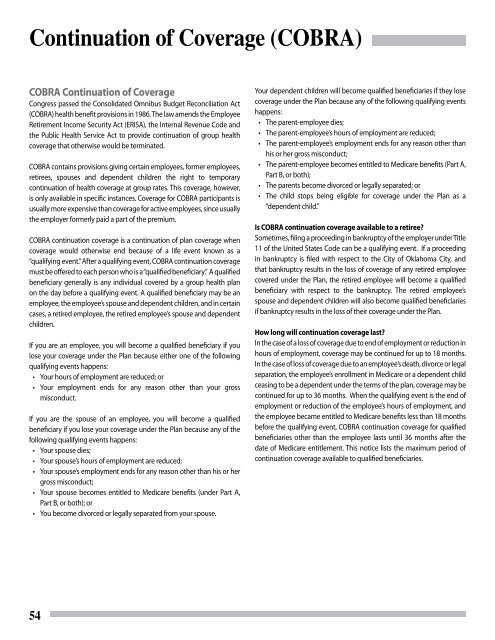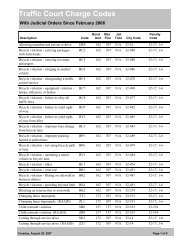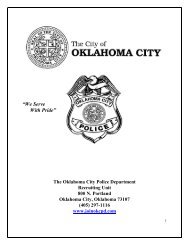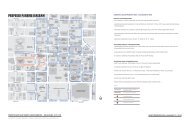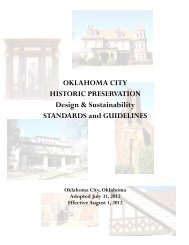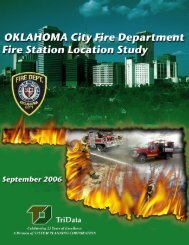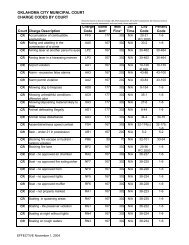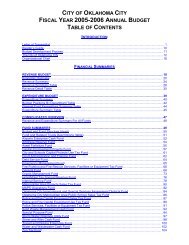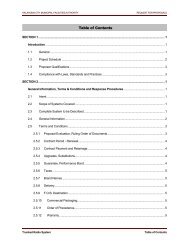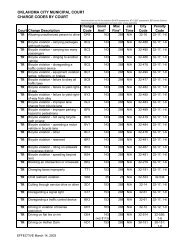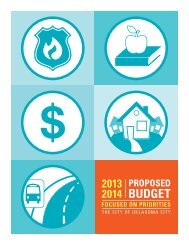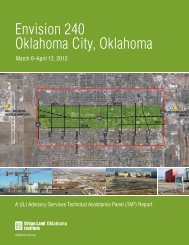Employee Benefit Guide 2012 - City of Oklahoma City
Employee Benefit Guide 2012 - City of Oklahoma City
Employee Benefit Guide 2012 - City of Oklahoma City
You also want an ePaper? Increase the reach of your titles
YUMPU automatically turns print PDFs into web optimized ePapers that Google loves.
Continuation <strong>of</strong> Coverage (COBRA)<br />
COBRA Continuation <strong>of</strong> Coverage<br />
Congress passed the Consolidated Omnibus Budget Reconciliation Act<br />
(COBRA) health benefit provisions in 1986. The law amends the <strong>Employee</strong><br />
Retirement Income Security Act (ERISA), the Internal Revenue Code and<br />
the Public Health Service Act to provide continuation <strong>of</strong> group health<br />
coverage that otherwise would be terminated.<br />
COBRA contains provisions giving certain employees, former employees,<br />
retirees, spouses and dependent children the right to temporary<br />
continuation <strong>of</strong> health coverage at group rates. This coverage, however,<br />
is only available in specific instances. Coverage for COBRA participants is<br />
usually more expensive than coverage for active employees, since usually<br />
the employer formerly paid a part <strong>of</strong> the premium.<br />
COBRA continuation coverage is a continuation <strong>of</strong> plan coverage when<br />
coverage would otherwise end because <strong>of</strong> a life event known as a<br />
“qualifying event.” After a qualifying event, COBRA continuation coverage<br />
must be <strong>of</strong>fered to each person who is a “qualified beneficiary.” A qualified<br />
beneficiary generally is any individual covered by a group health plan<br />
on the day before a qualifying event. A qualified beneficiary may be an<br />
employee, the employee’s spouse and dependent children, and in certain<br />
cases, a retired employee, the retired employee’s spouse and dependent<br />
children.<br />
If you are an employee, you will become a qualified beneficiary if you<br />
lose your coverage under the Plan because either one <strong>of</strong> the following<br />
qualifying events happens:<br />
• Your hours <strong>of</strong> employment are reduced; or<br />
• Your employment ends for any reason other than your gross<br />
misconduct.<br />
If you are the spouse <strong>of</strong> an employee, you will become a qualified<br />
beneficiary if you lose your coverage under the Plan because any <strong>of</strong> the<br />
following qualifying events happens:<br />
• Your spouse dies;<br />
• Your spouse’s hours <strong>of</strong> employment are reduced;<br />
• Your spouse’s employment ends for any reason other than his or her<br />
gross misconduct;<br />
• Your spouse becomes entitled to Medicare benefits (under Part A,<br />
Part B, or both); or<br />
• You become divorced or legally separated from your spouse.<br />
Your dependent children will become qualified beneficiaries if they lose<br />
coverage under the Plan because any <strong>of</strong> the following qualifying events<br />
happens:<br />
• The parent-employee dies;<br />
• The parent-employee’s hours <strong>of</strong> employment are reduced;<br />
• The parent-employee’s employment ends for any reason other than<br />
his or her gross misconduct;<br />
• The parent-employee becomes entitled to Medicare benefits (Part A,<br />
Part B, or both);<br />
• The parents become divorced or legally separated; or<br />
• The child stops being eligible for coverage under the Plan as a<br />
“dependent child.”<br />
Is COBRA continuation coverage available to a retiree?<br />
Sometimes, filing a proceeding in bankruptcy <strong>of</strong> the employer under Title<br />
11 <strong>of</strong> the United States Code can be a qualifying event. If a proceeding<br />
in bankruptcy is filed with respect to the <strong>City</strong> <strong>of</strong> <strong>Oklahoma</strong> <strong>City</strong>, and<br />
that bankruptcy results in the loss <strong>of</strong> coverage <strong>of</strong> any retired employee<br />
covered under the Plan, the retired employee will become a qualified<br />
beneficiary with respect to the bankruptcy. The retired employee’s<br />
spouse and dependent children will also become qualified beneficiaries<br />
if bankruptcy results in the loss <strong>of</strong> their coverage under the Plan.<br />
How long will continuation coverage last?<br />
In the case <strong>of</strong> a loss <strong>of</strong> coverage due to end <strong>of</strong> employment or reduction in<br />
hours <strong>of</strong> employment, coverage may be continued for up to 18 months.<br />
In the case <strong>of</strong> loss <strong>of</strong> coverage due to an employee’s death, divorce or legal<br />
separation, the employee’s enrollment in Medicare or a dependent child<br />
ceasing to be a dependent under the terms <strong>of</strong> the plan, coverage may be<br />
continued for up to 36 months. When the qualifying event is the end <strong>of</strong><br />
employment or reduction <strong>of</strong> the employee’s hours <strong>of</strong> employment, and<br />
the employee became entitled to Medicare benefits less than 18 months<br />
before the qualifying event, COBRA continuation coverage for qualified<br />
beneficiaries other than the employee lasts until 36 months after the<br />
date <strong>of</strong> Medicare entitlement. This notice lists the maximum period <strong>of</strong><br />
continuation coverage available to qualified beneficiaries.<br />
54


